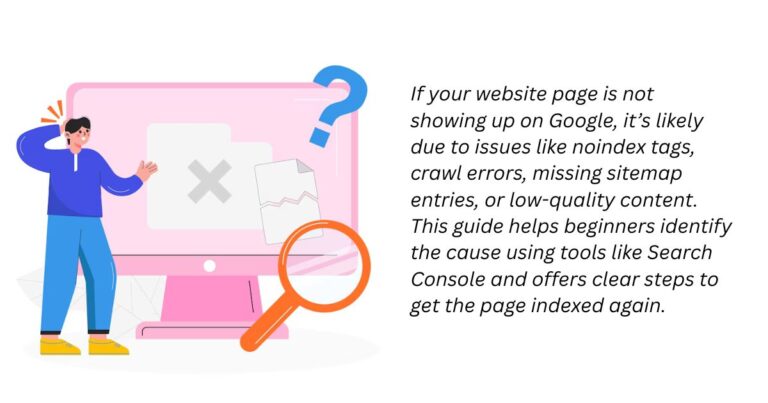If you’re a site owner or SEO enthusiast, you’ve probably experienced this mystery before: You publish a great page, Googlebot crawls it, but it doesn’t get indexed. Instead, Google Search Console (GSC) throws back this curious status: “Crawled – currently not indexed.”
Frustrating? Absolutely. Confusing? Totally. Fixable? Mostly, yes.
Let’s decode what this means, why it happens, and what you can do about it.
What Does “Crawled – Currently Not Indexed” Actually Mean?
In plain English, it means Google saw your page, visited it, read it—but decided not to add it to search results (at least for now).
It’s like hosting a dinner party, having a guest show up, sniff the food, and then quietly leave without saying goodbye.
But don’t panic—this doesn’t necessarily mean your content is bad or broken.
Why Is This Happening?
There’s no one-size-fits-all answer, but here are the most common reasons Google might skip indexing a page after crawling it:
1. Content Quality Isn’t Up to Par
Let’s be real—if the content is thin, duplicated, or low-value, Google probably thinks it’s not worth showing in search. This doesn’t mean it’s spammy; it could just mean it doesn’t offer anything new.
Example: A blog post repeating generic advice that already exists on 500 other websites.
2. Too Many Similar Pages
If you’ve got dozens (or hundreds) of pages that are eerily similar—like tag pages, product variations, or location-based duplicates—Google might choose to ignore some of them.
Real-life scenario: An e-commerce store with 100+ pages for “Red Shirt,” “Red Shirts,” “Red Shirts XL,” etc.
3. New Page with Low Authority
If your site is relatively new or lacks backlinks, Google may not rush to index every page immediately. It’s in “wait and see” mode.
Tip: It doesn’t hurt to build a few internal links pointing to the page.
4. Indexing Budget Limitations
Google doesn’t have unlimited time to index everything. It prioritizes based on signals like site structure, internal linking, authority, and historical behavior.
Translation: If your site’s overall crawl budget is tight, Google will pick its favorites first.
The Timing Factor: “Currently” Not Indexed
That “currently” is key. It suggests this might be temporary. Google may come back later and index it once it decides the page deserves a spot in the index.
So before tearing your site apart in panic—give it time. A few days or weeks, depending on the site.
How to Fix “Crawled – Currently Not Indexed”?
Let’s get to the good stuff: how to nudge Google into indexing that page.
1. Improve Content Depth and Uniqueness
Revisit the page. Does it say anything truly helpful, unique, or detailed? Does it solve a problem better than existing search results?
Checklist:
- Add original data, stats, examples, or case studies
- Include helpful images or videos
- Target long-tail keywords with real search intent
2. Build Internal Links to the Page
Link from relevant, already-indexed pages on your site. This gives Google a stronger signal that the page matters.
Pro tip: Use descriptive anchor text to help Google understand what the page is about.
3. Get External Backlinks (If You Can)
Yes, backlinks still matter. Even one high-quality link can push a page into index consideration.
If you shared the page on social media or forums and it got some buzz—nice! That may help.
4. Use the URL Inspection Tool
In Google Search Console, enter the page URL and click “Request Indexing.” It’s not a magic bullet, but it can speed up re-evaluation.
5. Submit or Update Your Sitemap
Ensure the page is included in your sitemap. Then resubmit the sitemap in GSC. This is especially helpful if your site structure has changed recently.
When Should You Worry?
Here’s the real talk: If your page has been sitting in “Crawled – currently not indexed” for more than 2–3 months, and you’ve already made improvements, it might be time to:
- Rework the content entirely
- Merge it with a similar, stronger page
- Noindex it (if it doesn’t add real value)
Not every page deserves to be indexed—and that’s okay. Focus on building a site where most pages clearly matter.
Bonus Tips from the Trenches
- Avoid publishing too many low-effort pages in bulk. That’s a crawl budget killer.
- Always audit your pages before publishing—ask, “Would I find this genuinely useful if I landed here?”
- Don’t obsess over indexation alone. Sometimes a few powerful, well-ranked pages drive more value than 100 mediocre ones in Google’s index.
“Crawled – currently not indexed” might feel like rejection—but it’s more like Google saying, “Not now, but maybe later.”
Focus on improving your content quality, technical health, and site authority, and in most cases, the indexation will follow naturally.
And remember: You’re not alone. Even seasoned SEOs face this issue—it’s just part of the game.
Need help diagnosing indexation issues on your site?
Drop your URL and question in the comments or hit me up—let’s solve it together.




